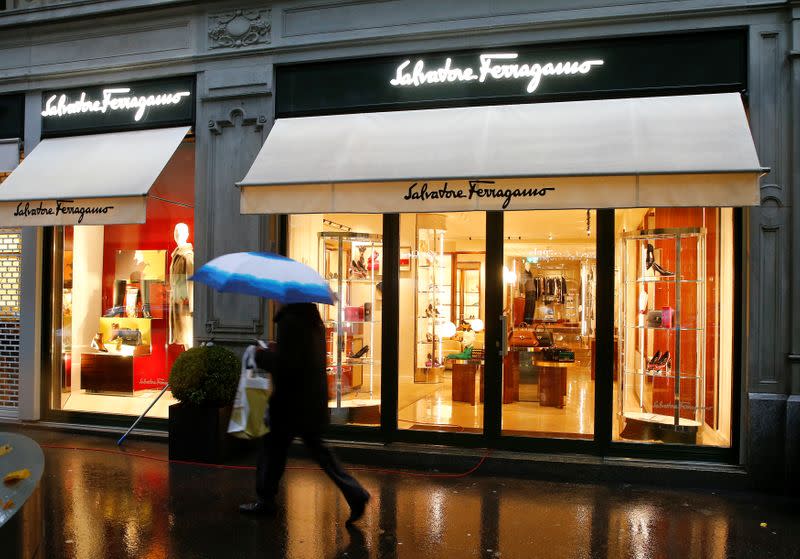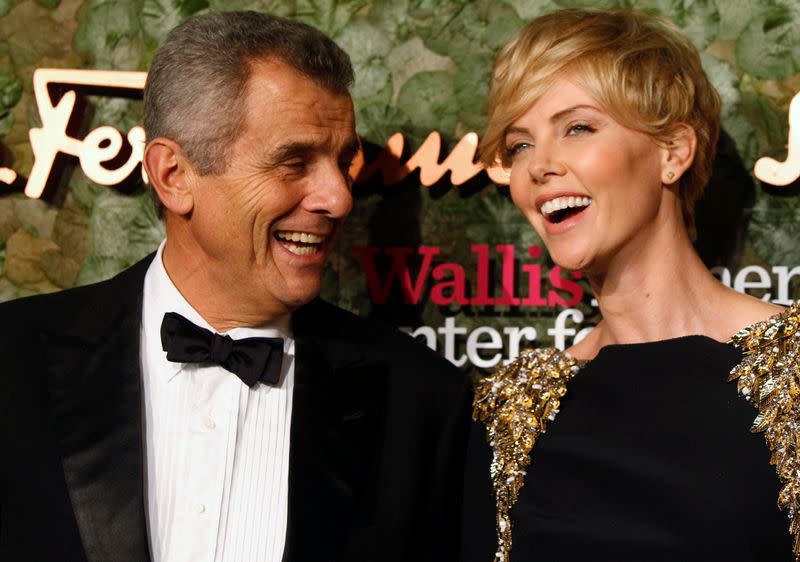Exclusive: Ferragamo family explores stake sale as stars' shoemaker seeks to recover shine - sources
By Pamela Barbaglia and Claudia Cristoferi
LONDON/MILAN (Reuters) - The family owners of Italian fashion house Salvatore Ferragamo <SFER.MI> have held informal talks with investors to sell a minority stake in their holding firm as they scramble to turn around the brand famous for shoes worn by Hollywood stars such as Audrey Hepburn, five sources told Reuters.
The company's chairman Ferruccio Ferragamo, son of late founder Salvatore, approached investors in September, offering a roughly 20% stake in the holding vehicle that controls the Milan-listed business, banking and private equity sources said on condition of anonymity as the matter is confidential.
A spokeswoman for the company - which has a market value of 2 billion euros ($2.4 billion) - denied that the Ferragamo family planned to sell the stake or had met investors.
The sources told Reuters the family is in the preliminary stages of testing market appetite, and that a deal might face resistance from investors since the Italian shoe dynasty is unwilling to relinquish any governance control.
Shares in Ferragamo spiked 11% and were automatically halted from trading after Reuters first reported on the talks.
After trading resumed the stock was up again 8.73% at 1600 GMT.
The Florentine leather goods brand saw its revenue plunge 60% in the second quarter of the year, piling pressure on its family members - who control 65% in total - to turn around the business.
"They have been calling around for a few months, targeting both private equity investors and sovereign wealth funds for a minority deal," one of the sources said.
A stake sale to cash-rich investors would help the company cope with the fallout of the COVID-19 crisis and resolve internal disagreements over the turnaround strategy, allowing some of its family members to cash out, the sources said.
Yet, with the luxury industry worldwide facing a major revenue hit from COVID-19, which first emerged in China - home to more than a third of global luxury shoppers - luring investors may be a struggle.
The reluctance of the family to cede any governance control could make a deal less attractive for private equity funds who could alternatively buy more liquid shares on the market, the sources said.
"Most investors would demand a big discount or at least some governance control to buy directly into the family holding rather than on the market," one of the sources said.
Some sovereign wealth funds such as Singapore state investor GIC and Temasek, as well as the Qatar Investment Authority (QIA), are also being targeted as possible long-term partners, the sources said.
Temasek teamed up with Dufry's chairman Juan Carlos Torres in 2016 to buy a stake in the family holding of Italian luxury firm Moncler.
FAMILY DYNASTY
Founded in Florence in 1927, Ferragamo was listed on the Milan stock market in 2011 but the family kept a tight grip on the company.
Salvatore Ferragamo, the eleventh of fourteen brothers, was born in a poor southern Italian village in 1898. As a teenager he emigrated to the United States, where he became famous as a shoemaker to the stars, including Greta Garbo and Marilyn Monroe.
When he died in 1960, his widow Wanda took the helm until their six children were old enough to join the family business. Rumours that the company might be put up for sale have intensified since Wanda's death in 2018.
Their heirs, including four surviving children and numerous grandchildren, are all invested in Ferragamo Finanziaria SpA, which owns 54.3% of the company. Other family members hold an additional 10.7%.
The high number of family investors has caused disagreements over strategy, the sources said, as the brand has been losing its shine in recent years.
Ferragamo has struggled to attract younger shoppers because of its limited online presence and a product line-up that needs refreshing.
The COVID-19 pandemic complicated efforts by Chief Executive Micaela Le Divelec to revamp the business and its stock has lost more than 36% since January.
The family called back former boss Michele Norsa in May to help drive an operational turnaround, a move that was seen by some industry observers as a possible prelude to a full sale.
In September, the company said it could no longer provide guidance on expected sales for 2020 because of the uncertainty caused by COVID-19, which had caused an operating loss of 74 million euros in the first half of 2020 compared with a 94 million euro profit last year.
(Reporting by Pamela Barbaglia in London and Claudia Cristoferi in Milan; Additional reporting by Silvia Aloisi; Editing by Elaine Hardcastle, Jan Harvey and Barbara Lewis)



